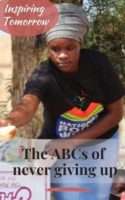It’s often said that the ones who’re successful today are the ones who didn’t give up on their dreams yesterday, and Banele’s story echoes that. Banele (25) is a disk jockey (DJ), known in the entertainment streets as ‘DJ Bara’, and aims to beat even more odds.
“This love for music dates way back to my high school days. Every Friday at school we’d spring-clean our classrooms. Everyone knew my class was the place to be on this day cos that’s where fun would be had. I was known as the beat-maker; I created house beats by rhythmically tapping desks with rulers and any hard object. My peers really enjoyed my ‘songs’,” he humorously recalls.
Banele finally learnt how to deejay but lack of equipment meant talent alone couldn’t take him anywhere.
“I come from an underprivileged background where my mother tried everything to keep the body and soul together. Sometimes we’d go to school on an empty stomach not knowing what we were going to eat when we come back. But music kept my mind off things and we survived.”
Speaking of his mom, Banele remembers how she didn’t dance to his tunes at all.
“My mom didn’t approve of my being a DJ cos being a DJ means you’re always out at night during weekends, and townships can be dangerous at those times. You know how mothers are; they want us to focus on school cos they believe anything else will disrupt you. But I have to say she eventually warmed up to the idea, she’s more open to it now than ever before.”
It was in 2015 when he moved to the Mother City but he didn’t instantly feel its motherly love.
“2015 came with its own challenges. I was an unknown DJ from East London and that meant nobody would freely give me a time slot. One owner was refusing to pay me, he gave me a run-around for my money. That discourages one a lot.”
Banele kept pushing the buttons and eventually hit the right ones.
“I eventually became a frequent DJ at the famous spot in Cape Town, Mzoli’s Butchery, and that was a platform to showcase my skills. Every Sunday I’d play there, serving the more mature audience with deep house music. Ever since then I’ve played in popular places such as Khayelitsha’s own restaurant The Milk in, SoChilla African Cuisine, Gqudu’s Butchery, Cash Sport Bar both in Gugulethu, and more… ”
Banele admits the industry in Cape Town is highly competitive and he’s had to distinguish himself from others.
“Almost every second DJ plays Gqom and I had to find my own genre that would set me apart from other DJs. I found out about amaPiano (a new popular house genre that comprises mainly of pianos) and I knew that was the music I wanted to push and specialise in. Now, local owners know who to talk to when they’re wanting to serve AmaPiano to their customers,” he adds.
Though he was himself unable to further his own studies, Banele acknowledges that entertainers should have something to fall back on.
“We are doing music for the love and passion for it. The money we make from gigs isn’t much to maintain us and our families. I’ve a full time job at a car hiring company where I inspect cars before they’re hired off and when returned. That allows me to take care of my family while I entertain my peers on the side.”
Banele is also a good ‘DJ’ in the kitchen as well, if the pictures he posts on Facebook are anything to go by.
He wouldn’t tone down the volume without sharing a few words of advice to the younger ones.
“You must have faith and confidence in yourself before everyone else. To young and upcoming DJs, practice indoors and envision you’re performing for a crowd. That’ll help you relax and contain your nerves when you’re having an actual performance,” he concludes.
***
What inspires you the most about Banele’s story?






